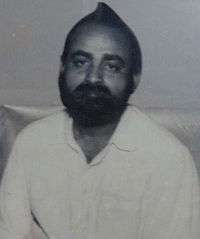Gopal Chandra Mukhopadhyay
| Gopal Chandra Mukhopadhyay গোপালচন্দ্র মুখোপাধ্যায় | |
|---|---|
|
Gopal Patha | |
| Born |
1913 Kolkata, Bengal, British India |
| Died |
2005 Kolkata, West Bengal, India |
| Nationality | Indian |
| Other names | Patha |
| Occupation | Business |
| Known for | Retaliating against Muslim League atrocities on Hindus during the Great Calcutta Killings. |
Gopal Chandra Mukhopadhyay (Bengali: গোপালচন্দ্র মুখোপাধ্যায়) (1913 – 2005), popularly known as Gopal Patha or Gopal Pantha (Bengali: গোপাল পাঁঠা), was an Indian businessman known for raising Bharat Jatiya Bahini to protect the Hindu people from the Muslim League attacks during the Great Calcutta Killings.[1][2][3]
Early life and career
Gopal was born in a Bengali Hindu family of Malanga Lane in the Bowbazar of Kolkata.[1] He was the nephew of revolutionary Anukul Chandra Mukhopadhyaya.[4] In childhood, he earned the nickname 'Patha' (goat, in Bengali), because his family ran a meat shop in College Street.[2][5] When he grew up, he took responsibility of running the meat shop. As a part of his business, he had to regularly interact with Muslim traders.[6] According to historian Sandip Bandyopadhyay, Gopal did not bear any grudge against the Muslims.[6]
Role during Partition violence
In 1946, the Muslim League gave a call for establishing Pakistan through 'Direct Action' on 16 August. The Muslim League government of Bengal declared a public holiday on that day. The Kolkata District Muslim League published a detailed program for a grand rally at the Kolkata Maidan. An image of Mohammad Ali Jinnah with a sword in hand was published.
Defending the Hindu society
On the morning of 16 August, incidents of stabbing and rioting started in the city. Gopal heard of trouble while he was on his way to shop. He rushed back to his locality where he saw Muslim League volunteers marching with long sticks in their hands. When the news of Hindus being killed reached him, he assembled his men and ordered them to retaliate, answer brutality with brutality. He clearly instructed that for one murder committed, they should commit ten murders. He recruited Basanta, a muscleman from Beadon Street to repulse the Muslim League mobs.[1]
The Bahini volunteers armed themselves with knives, swords, cleavers, sticks and rods. Gopal himself had two American-made 0.45 bore pistols along with some grenades. He had procured the pistols in post-War Kolkata from the American soldiers posted in the city. Some of the weapons used by his men were procured during the Quit India Movement. During the killings, Gopal sheltered many Hindu families and widows.[6]
After a few days of rioting, when the Muslim Leaguers realized that they had incurred heavy casualties, they proposed peace. G.G.Ajmiri, leader of the student's wing of Muslim League along with Mujibur Rahman, a member of the Muslim National Guard and a boxer and strongman himself, requested Gopal to stop the bloodshed.[2]
Refusal to surrender to Gandhi
In 1947, Mohandas Gandhi came to Kolkata and urged the Hindus to harbour any ill feeling towards the Muslims and appealed to them to surrender all their arms to him. Mohandas twice made a personal request to Gopal, but he didn't respond. The third time some Congress leader requested him to surrender at least some of his arms at Gandhi's feet. When Gandhi's secretary asked him why doesn't he surrender his arms to Gandhi, he replied,
| “ | I will not lay down even a nail if it has been used for defending Hindu honour. | ” |
Political connection
Gopal was an admirer and a staunch supporter of Subhas Chandra Bose. Coming from a family with a revolutionary background he didn't believe in Gandhian non-violence. He believed that India could only become independent by ousting the British by force. Though he didn't accept the leadership of Gandhi, he was close to some Congress leaders, among whom the foremost was Dr. Bidhan Chandra Roy. Gopal though maintained all along that his close relationship Dr. Bidhan Chandra Roy was more personal than political.
Later life
During the killings Gopal and Bharat Jatiya Bahini were hailed as saviours and Heroes. In his later life, Gopal became a social worker and ran a charity named National Relief Centre for Destitutes. He also started a community Durga Puja in his locality. During the Puja festivities, people flock to visit the famous Puja started by him.[7] In 2014, Hindu Samhati commemorated the birth centenary of Gopal Patha.[6]
References
- 1 2 3 Das, Suranjan (1994). "The 'Goondas': Towards a Reconstruction of the Calcutta Underworld through Police Records". Economic and Political Weekly. Economic and Political Weekly. 29 (44): 2879.
- 1 2 3 Whitehead, Andrew (July 1, 1997). "Duty does not permit repentance - The Butchers of Calcutta". Indian Express. Archived from the original on October 16, 2013. Retrieved March 5, 2011.
- ↑ Sengupta, Debjani (2006). "A City Feeding on Itself: Testimonies and Histories of 'Direct Action' Day" (PDF). SARAI. Retrieved March 5, 2011.
- ↑ Bandyopadhyay, Sandip (2010). ইতিহাসের দিকে ফিরে ছেচল্লিশের দাঙ্গা (Itihasher Dike Fire Chhechallisher Danga). Kolkata: Radical. p. 58. ISBN 978 - 81 85459-07-3.
- ↑ Khan, Yasmin (2007). The Great Partition: The Making of India and Pakistan. Yale University Press. p. 66. ISBN 0-300-12078-8. Retrieved March 6, 2011.
- 1 2 3 4 "Celebrating the centenary of a "divisive" figure". The Hindu. 18 August 2014. Retrieved 21 August 2014.
- ↑ "Howrah keeps alive 'tantrik' puja tradition". Times of India. October 25, 2003. Retrieved March 5, 2011.
